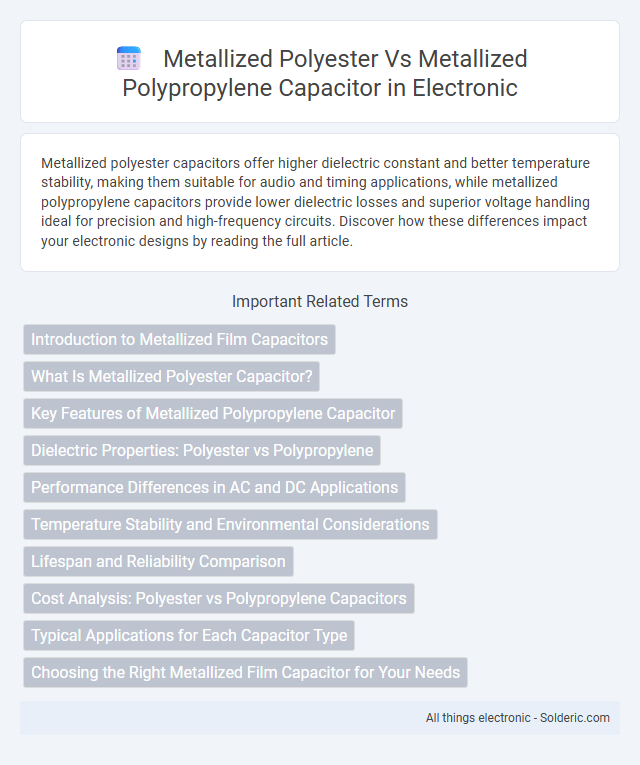Metallized polyester capacitors offer higher dielectric constant and better temperature stability, making them suitable for audio and timing applications, while metallized polypropylene capacitors provide lower dielectric losses and superior voltage handling ideal for precision and high-frequency circuits. Discover how these differences impact your electronic designs by reading the full article.
Comparison Table
| Feature | Metallized Polyester Capacitor | Metallized Polypropylene Capacitor |
|---|---|---|
| Dielectric Material | Polyester (PET) | Polypropylene (PP) |
| Operating Temperature | Up to 85degC | Up to 105degC |
| Dielectric Loss (tan d) | Higher (0.02 - 0.05) | Lower (0.0002 - 0.002) |
| Leakage Current | Moderate | Very Low |
| Capacitance Stability | Moderate | High |
| Self-Healing Property | Good | Excellent |
| Typical Applications | General purpose, coupling, timing circuits | Precision electronics, filters, audio circuits |
| Cost | Lower | Higher |
| Lifetime | Shorter | Longer |
Introduction to Metallized Film Capacitors
Metallized polyester and metallized polypropylene capacitors are widely used in electronic circuits for their excellent electrical properties and reliability. Metallized polyester capacitors offer high capacitance stability and good performance at moderate temperatures, making them suitable for general-purpose applications. Metallized polypropylene capacitors provide superior insulation resistance, low dielectric absorption, and excellent temperature stability, ideal for high-frequency and precision filtering tasks.
What Is Metallized Polyester Capacitor?
Metallized polyester capacitors use a thin polyester film coated with a metallic layer, providing excellent electrical insulation and stability in circuits requiring moderate capacitance and voltage ratings. These capacitors offer good dielectric strength and low dissipation factor, making them suitable for applications like signal processing and filtering. When selecting capacitors for your project, consider metallized polyester for its reliable performance in environments with moderate temperature and electrical stress.
Key Features of Metallized Polypropylene Capacitor
Metallized polypropylene capacitors offer high dielectric strength, low dissipation factor, and excellent self-healing properties, making them ideal for high-frequency and high-voltage applications. Their film is coated with a thin metal layer that provides superior stability and low dielectric losses compared to metallized polyester capacitors. These capacitors exhibit low moisture absorption, enhanced temperature stability, and a longer lifespan, ensuring reliable performance in precision electronic circuits.
Dielectric Properties: Polyester vs Polypropylene
Metallized polypropylene capacitors exhibit superior dielectric properties compared to metallized polyester capacitors due to their lower dielectric loss and higher insulation resistance, resulting in better performance at high frequencies and temperatures. Polyester capacitors, while more cost-effective and offering good dielectric constant, suffer from higher dielectric absorption and occasional moisture sensitivity, limiting their use in high-precision or high-stress applications. The molecular structure of polypropylene provides enhanced stability and reliability, making it ideal for applications requiring long-term durability and low dissipation factors.
Performance Differences in AC and DC Applications
Metallized polyester capacitors exhibit higher dielectric losses at high frequencies, making them less efficient for AC applications compared to metallized polypropylene capacitors, which offer superior stability and lower dissipation factors. In DC applications, metallized polypropylene capacitors provide better insulation resistance and longer lifespan due to their low dielectric absorption and high breakdown voltage. Performance differences in ripple current handling also favor polypropylene capacitors, enhancing reliability in power electronics.
Temperature Stability and Environmental Considerations
Metallized polyester capacitors exhibit moderate temperature stability, typically operating effectively up to 105degC, whereas metallized polypropylene capacitors maintain superior thermal performance, with stable operation up to 125degC or higher. Environmental considerations favor metallized polypropylene due to its lower dielectric absorption and reduced aging effects, resulting in enhanced reliability and longer lifespan in varying climates. Both types offer self-healing properties, but polypropylene capacitors generally outperform polyester in high-temperature and high-stress environments, making them preferable for critical applications.
Lifespan and Reliability Comparison
Metallized polyester capacitors typically offer a lifespan of up to 1,000 to 5,000 hours at rated conditions, while metallized polypropylene capacitors can exceed 10,000 hours, reflecting superior durability and thermal stability. Reliability-wise, metallized polypropylene capacitors exhibit lower dielectric absorption, reduced self-healing tendencies, and better resistance to moisture and temperature fluctuations, making them suitable for high-frequency and critical applications. The longer operational life and enhanced electrical performance of metallized polypropylene capacitors contribute to their preference in demanding environments requiring consistent capacitance and minimal degradation.
Cost Analysis: Polyester vs Polypropylene Capacitors
Metallized polyester capacitors typically offer a lower cost solution due to cheaper raw materials and simpler manufacturing processes compared to metallized polypropylene capacitors. Polypropylene capacitors, while more expensive, provide superior dielectric properties such as lower dielectric loss and higher voltage ratings, justifying their higher price in high-performance applications. Cost analysis must balance initial expenditure against application-specific performance requirements and longevity, with polyester favored for budget constraints and polypropylene for demanding electrical environments.
Typical Applications for Each Capacitor Type
Metallized polyester capacitors are commonly used in audio equipment, power supplies, and general-purpose filtering due to their stable dielectric properties and moderate temperature range. Metallized polypropylene capacitors are preferred in high-frequency circuits, precision analog applications, and pulse discharge environments because of their low dielectric losses, high insulation resistance, and superior self-healing characteristics. Typical applications for metallized polypropylene capacitors include film capacitors in audio crossover networks, motor run capacitors, and snubber circuits.
Choosing the Right Metallized Film Capacitor for Your Needs
Metallized polyester capacitors offer high capacitance values and excellent stability for general-purpose applications, while metallized polypropylene capacitors provide superior low loss, high insulation resistance, and enhanced self-healing properties ideal for high-frequency and precision circuits. Your choice depends on the specific application requirements such as voltage rating, frequency response, and environmental conditions, with polypropylene capacitors preferred in audio, RF, and power electronics for their reliability and long-term stability. Understanding these key performance differences ensures you select the appropriate metallized film capacitor to optimize circuit efficiency and longevity.
Metallized polyester vs metallized polypropylene capacitor Infographic

 solderic.com
solderic.com